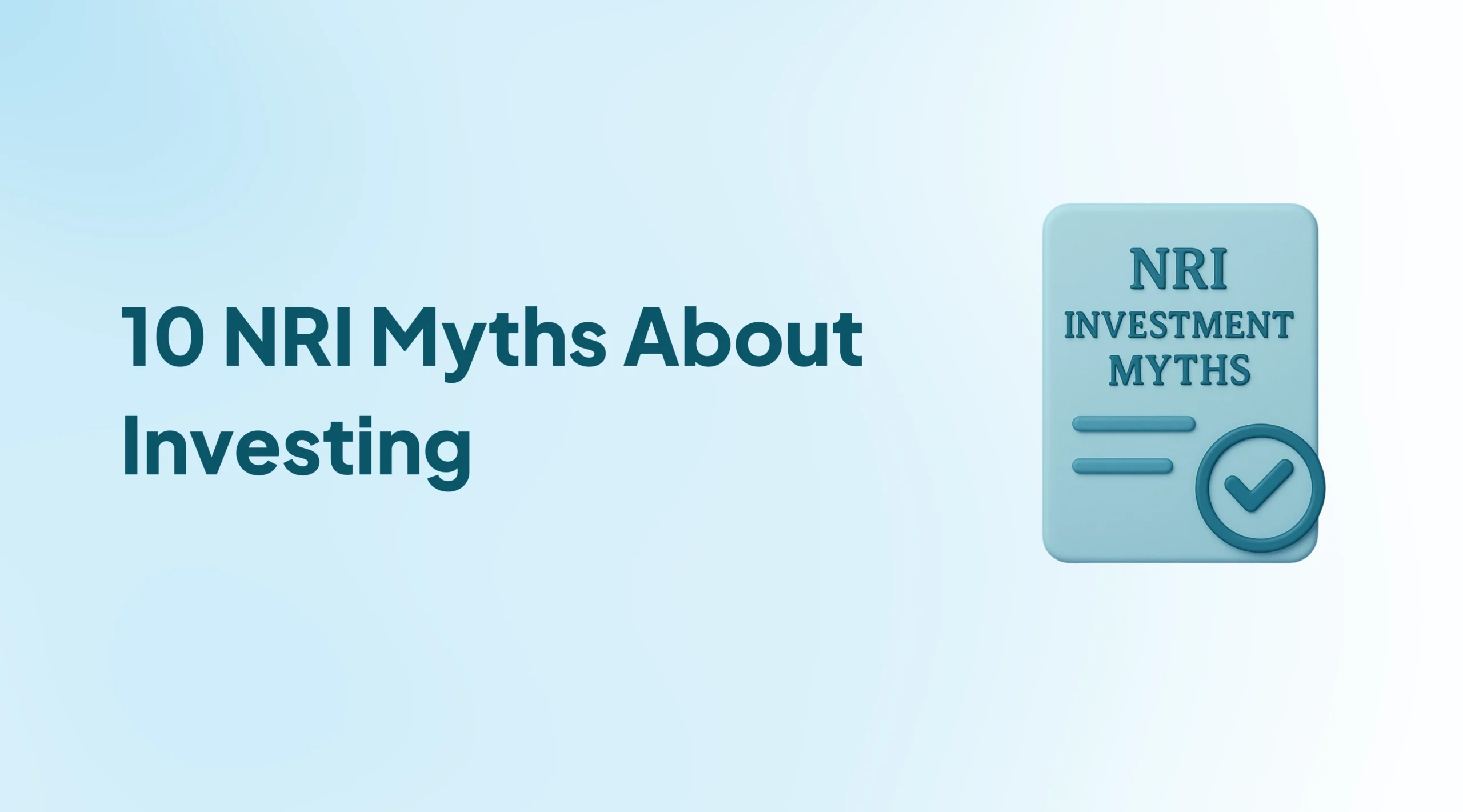Investing in India as a Non-Resident Indian (NRI) can be a daunting task, often complicated by a web of myths and misconceptions. Many NRIs hesitate or make misinformed decisions due to these persistent myths. This article aims to debunk 10 common NRI investment myths, providing clarity and helping NRIs invest confidently and legally in India. By understanding the truth behind these myths, you can make smarter financial decisions and ensure compliance with Indian regulations.
Why NRIs Face Investment Confusion
Investing in India as an NRI comes with its own set of challenges. The regulatory landscape is complex, with guidelines from the Foreign Exchange Management Act (FEMA), the Reserve Bank of India (RBI), and the Securities and Exchange Board of India (SEBI) to navigate. Misleading advice on forums and social media adds to the confusion, as does the fear of tax complications. Many NRIs are unsure about the legalities and tax implications of their investments, leading to hesitation and missed opportunities.
10 Common NRI Investment Myths – And the Truth
Myth 1: NRIs Cannot Invest in Indian Mutual Funds
Truth: NRIs are allowed to invest in Indian mutual funds under specific Know Your Customer (KYC) guidelines, including the Foreign Account Tax Compliance Act (FATCA) and the Common Reporting Standard (CRS). This means that as long as you comply with these regulations, you can diversify your investment portfolio with mutual funds in India.
Myth 2: NRIs Cannot Buy Real Estate in India
Truth: NRIs are permitted to buy real estate in India, except for agricultural land, plantations, and farmhouses. This opens up a wide range of opportunities for NRIs looking to invest in residential or commercial properties. However, it’s essential to understand the specific regulations and restrictions to make informed decisions.
Myth 3: NRE Accounts Offer Tax-Free Returns Forever
Truth: While NRE accounts offer tax-free returns in India, it’s crucial to check the taxation laws in your country of residence, as some countries tax global income. This means that while you might not pay taxes on NRE account returns in India, you could still be liable for taxes in your country of residence.
Myth 4: All Indian Investment Options Are Open to NRIs
Truth: There are some restrictions on certain investment options for NRIs, such as the Public Provident Fund (PPF) and small savings schemes. It’s important to be aware of these restrictions to avoid any legal complications. Always check the eligibility criteria before investing in any financial instrument.
Myth 5: NRIs Cannot Invest in Stocks Directly
Truth: NRIs can invest in the Indian stock market directly through the Portfolio Investment Scheme (PIS) using NRE/NRO demat accounts with SEBI-registered brokers. This allows NRIs to participate in the Indian stock market and benefit from its growth potential.
Myth 6: Double Taxation Means You Pay Twice
Truth: The Double Taxation Avoidance Agreement (DTAA) provides relief to NRIs, ensuring they do not pay tax twice on the same income. This means that if you pay taxes on your income in India, you can claim relief in your country of residence, and vice versa. Understanding DTAA can help you optimize your tax planning and avoid double taxation.
Myth 7: Real Estate Is Always the Best NRI Investment
Truth: While real estate can be a lucrative investment, it’s essential to evaluate the return on investment (ROI), liquidity, tax compliance, and maintenance costs. Real estate investments require careful consideration and should be part of a diversified investment portfolio. It’s not always the best option for everyone, and it’s crucial to assess your financial goals and risk tolerance.
Myth 8: NRI Tax Filing in India Is Optional
Truth: Filing taxes in India is mandatory for NRIs if their income exceeds the threshold limit, even if Tax Deducted at Source (TDS) has been deducted. It’s important to stay compliant with Indian tax laws to avoid any penalties or legal issues. Always consult a tax advisor to understand your tax obligations and ensure timely filing.
Myth 9: NRIs Can’t Invest in Indian FDs
Truth: Special fixed deposit schemes like NRE, NRO, and FCNR deposits are available for NRIs. These deposits offer competitive interest rates and are a safe investment option for NRIs looking to park their funds in India. It’s essential to understand the features and benefits of these deposit schemes to make informed investment decisions.
Myth 10: Once NRI, Always NRI for Tax
Truth: Your residential status for tax purposes is evaluated yearly under Indian tax law. This means that even if you are an NRI, your residential status can change based on your stay in India and other factors. It’s crucial to stay updated with the latest tax laws and regulations to ensure compliance and optimize your tax planning.
Key NRI Investment Rules to Know in 2025
Understanding the key investment rules for NRIs is essential for making informed and compliant investment decisions. Here are some crucial guidelines to keep in mind:
- FEMA Guidelines: The Foreign Exchange Management Act (FEMA) regulates foreign exchange and investments in India. NRIs must comply with FEMA guidelines when investing in India.
- KYC Norms: Know Your Customer (KYC) norms, including PAN, FATCA, and CRS, are essential for NRI investments. Ensure that your KYC documentation is up to date to avoid any legal complications.
- RBI Approvals: Certain investment instruments require approval from the Reserve Bank of India (RBI). It’s important to be aware of these requirements and obtain the necessary approvals before investing.
How to Avoid Common NRI Investment Mistakes
Avoiding common investment mistakes is crucial for NRIs looking to invest in India. Here are some tips to help you make smarter investment decisions:
- Check Eligibility and Documentation: Always verify your eligibility and ensure that your documentation is in order before investing in any financial instrument.
- Understand Tax Implications: Be aware of the tax implications of your investments in both India and your country of residence. Consult a tax advisor to optimize your tax planning and ensure compliance.
- Use Regulated Advisors and Brokers: Work with regulated advisors and brokers to ensure that your investments are compliant with Indian regulations. This can help you avoid legal complications and make informed investment decisions.
Best NRI Investment Options in India 2025
India offers a wide range of investment options for NRIs. Here are some of the best investment options to consider in 2025:
- Mutual Funds: Mutual funds offer diversification and professional management, making them an excellent investment option for NRIs. Consider investing in equity and debt mutual funds based on your risk tolerance and financial goals.
- NRE/NRO/FCNR Deposits: These fixed deposit schemes offer competitive interest rates and are a safe investment option for NRIs. Understand the features and benefits of these deposits to make informed decisions.
- Direct Equity: Investing in the Indian stock market through the Portfolio Investment Scheme (PIS) allows NRIs to participate in the growth potential of Indian companies. Work with SEBI-registered brokers to ensure compliance and make informed investment decisions.
- Real Estate: While real estate can be a lucrative investment, it’s essential to evaluate the ROI, liquidity, tax compliance, and maintenance costs. Consider real estate as part of a diversified investment portfolio.
FAQs on NRI Investments
Can NRI invest in mutual funds?
Yes, NRIs can invest in Indian mutual funds under specific KYC guidelines, including FATCA and CRS.
What are NRI real estate rules?
NRIs are permitted to buy real estate in India, except for agricultural land, plantations, and farmhouses. It’s essential to understand the specific regulations and restrictions before investing.
How is NRI income taxed in India?
NRI income is taxed in India based on the residential status and the type of income. It’s crucial to stay updated with the latest tax laws and regulations to ensure compliance and optimize your tax planning.
Is NRO FD interest taxable?
Yes, the interest earned on NRO fixed deposits is taxable in India. It’s important to be aware of the tax implications and ensure timely filing of taxes.


0 Comments